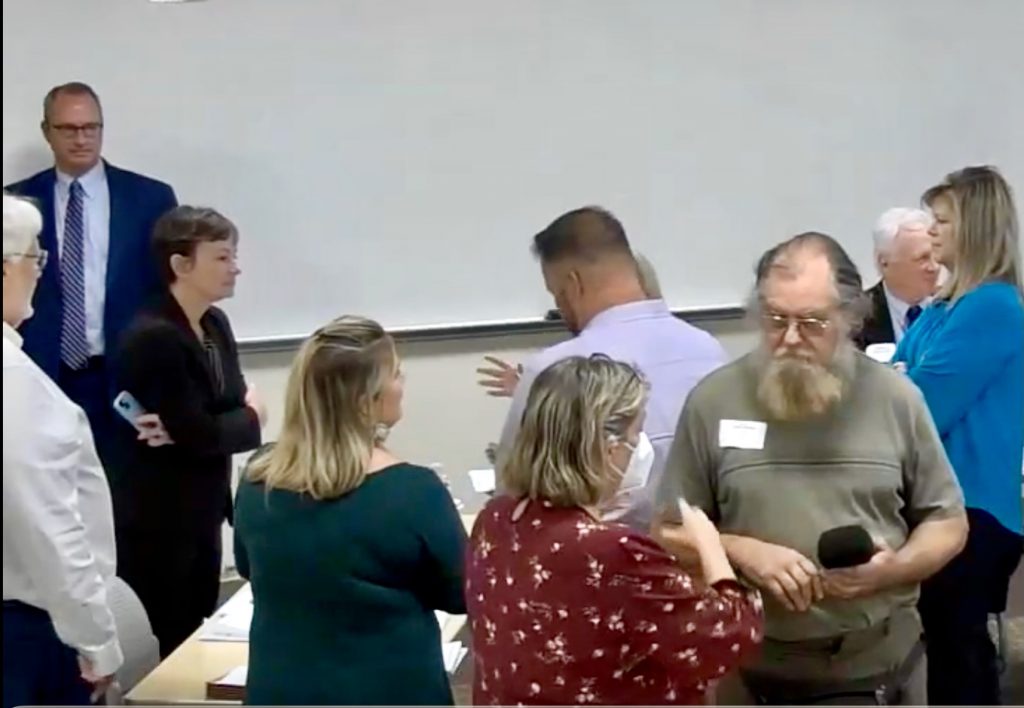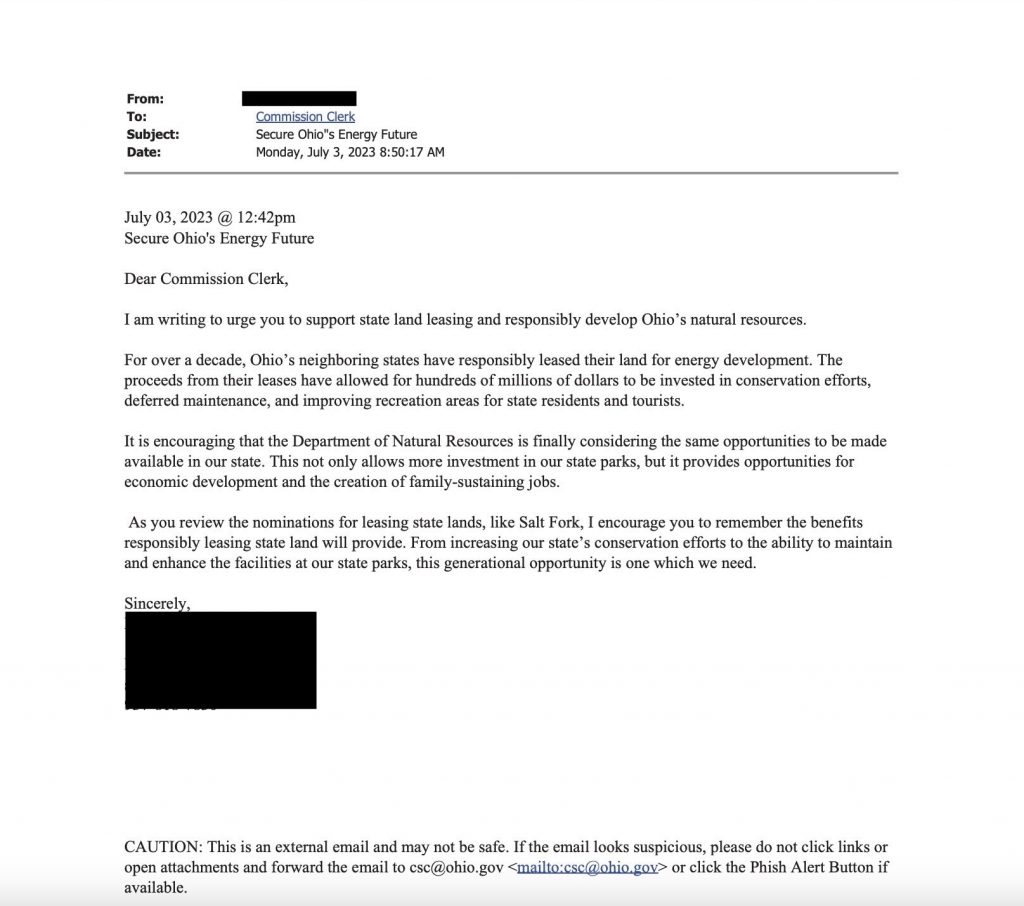Ohio attorney general launches investigation into fraudulent letters supporting fracking in state parks as controversy continues over new law mandating mineral rights leases on public lands
Lorelei Goff | September 22, 2023 | 1 Comment
By Lorelei Goff

Ohio Oil and Gas Land Management Commission Chair Ryan Richardson, third from left, speaks with Ohio residents following a September 18 commission meeting. Richardson said during the meeting that an investigation into allegedly fraudulent email comments submitted to the commission are not relevant to the approval process for nominating public land tracts for fracking. Screenshot of Ohio Oil and Gas Land Management Commission Meeting
As Ohio moves forward with leasing public lands for oil and gas fracking, allegations that supporters filed fraudulent letters in favor of these leases — using real Ohioans’ identities without their consent — have prompted the state attorney general to investigate.
Ohio Gov. Mike DeWine signed legislation in January mandating mineral rights leases to oil and gas drilling companies for fracking operations beneath Ohio State Parks and other public lands. Oil and gas companies have nominated dozens of tracts of land for leasing since the law took effect May 30.
A public comment period for a nomination to lease mineral rights for fracking beneath Salt Fork State Park – the state’s largest at approximately 7,000 acres – closes September 25.
Environmental groups and concerned citizens continue to protest the use of public lands for fracking.
Now, some Ohio residents say their names appear on emailed letters they didn’t write, that urge Ohio’s Oil and Gas Land Management Commission to support state land mineral leases and develop oil and gas resources.
According to a report by Jake Zuckerman on the cleveland.com website, one bore the signature of a 9-year-old child.
“In one set of comments, 1,100 letters were submitted in five batches, with hundreds of letters in each batch showing a timestamp of a single minute,” said Save Ohio Parks steering committee member Cathy Cowan Becker in a September 15 press release.
“The information for Ohioans whose names were on those letters included phone numbers, so a dozen Save Ohio Parks volunteers called 735 of those numbers. We reached 115 people and of those, 98 told our volunteers they did not submit the letter.”
Some Ohio residents say their names appear on emails submitted to Ohio’s Oil and Gas Land Management Commission – like the one above – that they didn’t write. The letters urge the commission to support state land mineral leases and develop oil and gas resources. Screenshot of email posted to Ohio Attorney General’s Office website[/caption]
Molly Jo Stanley, Southeast Ohio regional director for the Ohio Environmental Council, points out that while the fossil fuel companies submitting nominations remain anonymous, Ohio residents’ names and addresses become public record when they submit comments.
“Fossil fuel interests exploited Ohioans by preying upon their identities for their own financial gain, resulting in numerous residents’ personal information — including a minor — being exposed online without their consent,” Stanley says in the release.
Roxanne Groff, an environmental activist with Save Ohio Parks, noticed the suspicious nature of the letters after obtaining them from the Oil and Gas Land Management Commission through a public records request. The group then sent a letter to the commission alerting them to the possibly fraudulent emails on July 16.
Groff says the Ohio Environmental Council then traced the emails to Consumer Energy Alliance, a Texas-based nonprofit funded in part by the oil and gas industry that lobbies for fossil fuel interests, through a link to a CEA webpage that contained the same wording as the suspicious emails. The webpage is no longer accessible on the CEA website.
“We could not verify the other 1,600 emails sent from [Ohio’s Energy Future Coalition],” Groff says
An independent investigation by Zuckerman found that Ohio’s Energy Future Coalition shared an address with the Affordable Energy Fund PAC, which has oil and gas industry connections.

Some Ohio residents say their names appear on emails submitted to Ohio’s Oil and Gas Land Management Commission – like the one above – that they didn’t write. The letters urge the commission to support state land mineral leases and develop oil and gas resources. Screenshot of email posted to Ohio Attorney General’s Office website
Ohio residents whose names were used to submit letters without their knowledge or permission can contact the commission to have the letters removed. Letters submitted as public comments can be viewed on the ODNR website.
“The commission is currently working on creating a public comments portal where people can directly submit their comments to the website with additional authentication tools,” reads a statement issued by Ohio Department of Natural Resources spokesperson Andy Chow.
Ohio House Minority Leader Allison Russo, along with the environmental groups Save Ohio Parks and the Ohio Environmental Council, called for an investigation, and Ohio Attorney General Dave Yost has begun ordering subpoenas.
“This isn’t about energy development policy; it’s about using people’s identities for political messaging without their knowledge or consent, and it’s not OK,” Yost is quoted as saying in a September. 12 report by Ohio-based ABC and FOX Television affiliate WSYX.
ODNR is encouraging anyone who believes they are the victim of identity theft or fraud to reach out to the state attorney general’s office.
Nineteen organizations have called for a pause on issuing state land leases for fracking until the investigation has been completed.
OGLMC Chair Ryan Richardson said the commission will go forward with the nomination process as mandated by the state law.
“The statute’s terms state – in my view abundantly clear – that the general assembly, which is the body responsible for making these policies, has determined that these state lands will be opened up for potential leasing, and I don’t believe we have the authority today as a commission to decide whether that will be allowed generally, whether drilling will be allowed generally,” said Richardson in her opening comments during a volatile September 18 public meeting of the commission. “Those are calls for the legislature to make and they have made them.”
Richardson also said the emails in question support developing oil and gas resources generally and are not directly relevant to examining the specific applications the commission has received, and that the attorney general’s investigation is not relevant to the commission’s approval process.
“From my perspective, those comments, whether there is one that is invalid, whether they’re all invalid, that is not going to alter my decision-making today, given the limited scope that we have before us.”
Residents and representatives of environmental groups vehemently protested fracking on public lands during the meeting and demanded the Oil and Gas Land Management Commission deny the applications for nomination.
Fifteen nominations for land leasing have been submitted to the Oil and Gas Land Management Commission as of September 21, Chow wrote, including parcels in Ohio Department of Transportation property, Ohio State University Research property, Salt Fork State Park, Wolf Run State Park, Valley Run Wildlife Area and Zepernick Wildlife Area.
The commission voted at the Sept. 18 meeting to approve nominations for four ODOT properties identified as 23-ODOT-0001 through 23-ODOT-0004. Those nominated land leases will be up for bid in October, according to Ohio Department of Natural Resources Spokesperson Andy Chow.
The commission voted to table the decision for parcels owned by Ohio Department of Natural Resources until certain restrictions are worked out. Those parcels include parts of Salt Fork State Park, Wolf Run State Park, Valley Run Wildlife Area and Zepernick Wildlife Area.
Buckeye Environmental Network, Ohio Valley Allies, Sierra Club and the Ohio Environmental Council filed a lawsuit in April, claiming that Ohio’s constitutional requirements were violated during the passage of Ohio House Bill 507, which mandates the leases.
More than 80,000 wells have been fracked in Ohio since 1952, according to state regulators, and the state also accepts fracking waste shipped from other states with stricter regulations.

Hydraulic fracturing, or fracking, is a shale-gas extraction technique that forces fluids underground to fracture rock and free trapped oil or natural gas. To frack beneath Ohio public lands, companies will use a method called directional boring to drill vertically underground and then pivot horizontally. Illustration by Brandon Laufenberg
Hydraulic fracturing, or fracking, is a shale-gas extraction technique that forces fluids underground to fracture rock and free trapped oil or natural gas.
Fracking fluids can contain any of hundreds of toxic chemicals, heavy metals, corrosive salts and radioactive materials, many of which are carcinogenic and can cause genetic mutations or harm the central nervous system.
A clever use of federal patent law, known as the Halliburton Loophole, allows the oil and gas industry to keep the ingredients of fracking fluid a proprietary secret, and companies are exempted from certain federal regulations in the Clean Water Act, the Safe Drinking Water Act, the Superfund program and other environmental laws.
To frack beneath the public lands, companies will use a method called directional boring to drill vertically underground and then pivot horizontally to access the area.
A study published in the journal Environmental Pollution in April states “hydraulic fracturing impacts drinking water and human and environmental health,” and calls for the Halliburton Loophole to be revisited.
“Each of these chemicals is associated with serious health effects,” says the report, which adds, “Insufficient regulatory oversight, including the absence of a federally mandated disclosure mechanism, enables fracking companies to exploit trade secret provisions.”
The study only considered chemicals voluntarily disclosed by the industry or mandated for disclosure by a particular state, which is a fraction of the potentially hazardous chemicals used in fracking operations.
According to Youngstown State University geologist Ray Beiersdorfer, fracking fluids can leak and contaminate groundwater.
“They are drilling through the water table,” Beiersdorfer explained for a 2018 article in The Appalachian Voice. “Industry’s own data shows that cement fails. If you have a well that is 30 years old, there’s a 50% chance that the well is going to fail, and stuff can migrate [out of the wells].”
He adds, “Cement corrodes over time, particularly down deep underground where you have these caustic chemicals reacting with it. And quite often, right from the beginning on the vertical wells, there’s typically about a 6% failure rate where they don’t get a good seal with the cement.”
Environmental experts and Ohio residents have also raised concerns about overuse of limited water resources for fracking operations, noise and light pollution, impacts to wildlife, earthquakes, and safety hazards at drilling sites and during transport of fracking waste.
Editor’s note: This story has been updated to reflect that an independent investigation by Jake Zuckerman found that Ohio’s Energy Future Coalition shared an address with the Affordable Energy Fund PAC, which has oil and gas industry connections.
Like this content? Subscribe to The Voice email digests
Is there an update on this story?